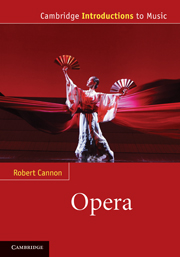Book contents
- Frontmatter
- Contents
- Tables
- Introduction
- Part I The seventeenth and eighteenth centuries
- Part II The nineteenth century
- Part III The twentieth and twenty-first centuries
- Chapter 13 The turn of the century and the crisis in opera
- Chapter 14 First modernism: Symbolist and Expressionist opera
- Chapter 15 The dramaturgy of opera: libretto – words and structures
- Chapter 16 Narrative opera: realistic and non-realistic
- Chapter 17 Radical narratives
- Chapter 18 Directors and the direction of opera
- Appendix 1 Motifs from The Ring used in Chapter 10
- Appendix 2 The development of singing voices in opera
- Appendix 3 The development of lyric theatre alternatives to ‘opera’
- Appendix 4 Some major operas and artistic and political events of the twentieth century, 1899--2008
- Glossary of key terms
- Notes
- Bibliography
- Index
Chapter 13 - The turn of the century and the crisis in opera
from Part III - The twentieth and twenty-first centuries
Published online by Cambridge University Press: 05 June 2012
- Frontmatter
- Contents
- Tables
- Introduction
- Part I The seventeenth and eighteenth centuries
- Part II The nineteenth century
- Part III The twentieth and twenty-first centuries
- Chapter 13 The turn of the century and the crisis in opera
- Chapter 14 First modernism: Symbolist and Expressionist opera
- Chapter 15 The dramaturgy of opera: libretto – words and structures
- Chapter 16 Narrative opera: realistic and non-realistic
- Chapter 17 Radical narratives
- Chapter 18 Directors and the direction of opera
- Appendix 1 Motifs from The Ring used in Chapter 10
- Appendix 2 The development of singing voices in opera
- Appendix 3 The development of lyric theatre alternatives to ‘opera’
- Appendix 4 Some major operas and artistic and political events of the twentieth century, 1899--2008
- Glossary of key terms
- Notes
- Bibliography
- Index
Summary
Naturalism and Verismo
Operatic Naturalism, most often associated with Italian Verismo, was the culmination of straightforward dramatic narrative and musical language: thereafter both started to fragment and develop more complex experiences. Until the later nineteenth century, the history of the arts presents a relatively clear development. From thereon, under a number of pressures, they began to fragment into a series of alternative, vying and often simultaneous movements. These ‘isms’ of the early twentieth century are most clearly seen in painting with several of them (highlighted in Table 13.1) paralleled in opera.
Naturalism is a philosophical movement that emerged in the mid nineteenth century as a response to growing industrialisation, urbanisation and the Darwinian scientific view of man. This responded to a view of the the human condition as completely determined by the material forces of the market and the social and physical environment this created. To Victor Hugo's emphasis on ‘exactness in the matter of locality’, Zola now added specific period, saying that his Rougon-Maquart novels would have been impossible before 1889: ‘I shall show this group at work, participating in an historical period…And thus the dramas of their individual lives recount the story of the Second Empire, from the ambuscade of the Coup d’Etat to the treachery of Sedan’ (Zola, ‘General Preface’ to the Rougon-Maquart novels).
- Type
- Chapter
- Information
- Opera , pp. 257 - 293Publisher: Cambridge University PressPrint publication year: 2012



